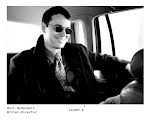Monday, July 9, 2012
Henry Adams, Guest Blogger
My guest blogger this week is Henry Adams, perhaps
America's first great historian - the first I know of at
least. The great grandson of John Adams and grandson
of John Quincy Adams, he was of the first Adams
generation to give up the ambition of being president.
(His father, Charles Francis Adams, nursed the ambition
though not able to realize it.)
Here Adams writes of the Founding Fathers's attitude
toward military spending:
Granting that the American people were about to risk
their future on a new experiment, they naturally wished to throw aside all burdens of which they could rid themselves. Believing that in the long run interest, not violence, would rule the world, and that the United States must depend for safety and success on the interests they could create, they were tempted to look upon war and preparations for war as the worst of blunders; for they were sure that every dollar capitalized in industry was a means of overthrowing their enemies more effective than a thousand dollars spent on frigates or standing armies. The success of the American system was, from this point of view, a question of economy.
- History of the United States During the
1st Administration of Jefferson, Part I*
Some of us still agree with the Founding Fathers that not
all money spent on defense makes America safer or
stronger. In fact as as it diverts money away from vitals needs,
such as educational opportunity for all, safe highways & bridges
and clean water, military spending can make us less safe.
Too much military spending can even destroy a nation. Look at
what happened to the Soviet Union in the 1980s and early 90s
when excessive spending on defense led to the collapse of the
government and the break up of the empire.
It would be ironic if we couldn't escape the same fate for ourselves.
*Adams, Henry, History of the United States During the First Administration of Jefferson, Part I,
Charles Scribners' Sons, New York, 1891, p. 162.
Note: Please ignore the white highlighting. I do not know why it
shows up and have been unable to rid myself of it. If you have
any insight, please let me know.
Subscribe to:
Post Comments (Atom)


No comments:
Post a Comment